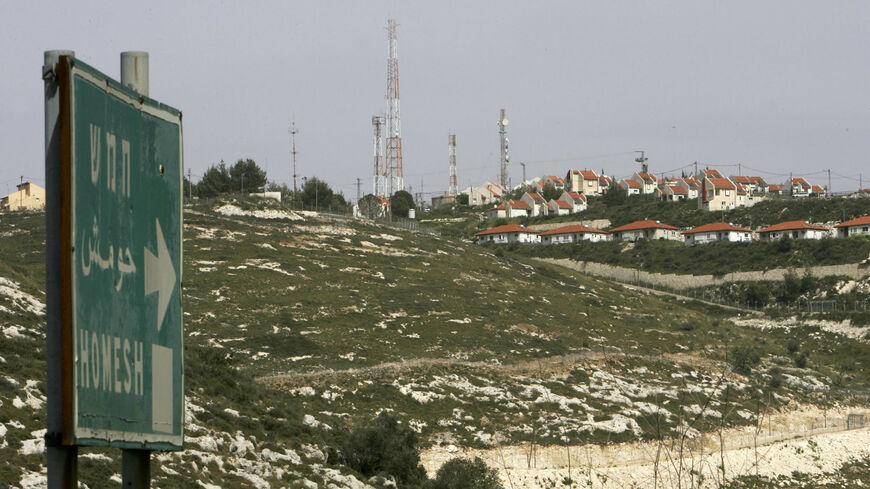White House Press Secretary Karine Jean-Pierre expressed on Thursday Washington’s dismay over recent moves by the Israeli government for expanding West Bank settlements, echoing similar statements earlier in the week by other senior American officials.
Jean-Pierre noted that the Biden administration strongly opposes any unilateral measures that exacerbate tensions. “Settlement expansion and construction in the heart of the West Bank, including the legalization of outposts, create facts on the ground that undermine a two-state solution,” she noted.
Earlier in the week, Secretary of State Antony Blinken’s office issued a statement, noting that Israeli decisions on expanding settlement construction went against longstanding US policy maintained by both Democratic and Republican administrations.
The Thursday statement of Jean-Pierre was issued one day only after a Knesset preliminary vote on repealing part of the 2005 Gaza disengagement law. If approved by two more Knesset readings, the new law will rescind the ban on Israeli settlements in the northern part of the Samaria West Bank region, which has been in force for 17 years. At the time, Israel decided to withdraw unilaterally not only from the Gaza Strip but also from four small West Bank settlements — Homesh, Sanur, Ganim and Kadim. Despite periodic attempts by settlers to return there, which usually end in their removal by soldiers, the ban has been maintained — until now.
Attorney Dov Weisglass, the top aide of then-Prime Minister Ariel Sharon who engineered the Gaza pullout, talked to Al-Monitor about the implications of the government’s support for revoking that law, warning against a diplomatic conflagration.
“This is simply amazing. Just like that, the government revoked the law without considering the implications of this move, without understanding that the withdrawal was part of an Israeli deal with the United States — an explicit Israeli government commitment in return for valuable diplomatic assets from the United States. If I were the US administration, I really don’t know how I would react,” Weisglass said.
The radical right push for removal of the ban on Israeli presence in northern Samaria is part and parcel of plans to expand settlement throughout the West Bank.
Jewish Power Knesset member Limor Son Har-Melech told Al-Monitor that as far as she and her associates were concerned, the next stage will be to rebuild the four settlements that were razed. “The time has come to resettle northern Samaria, otherwise it will turn into a focal point of anti-Jewish terrorism,” she said.
Prime Minister Benjamin Netanyahu absented himself from the Knesset vote. “He knew that a ‘yay’ would be interpreted as poking a finger, or maybe even two, in the administration’s eyes,” Weisglass said. “Netanyahu fully understands the significance of rescinding the northern Samaria law.”
Netanyahu was a senior member of the Sharon government at the time (2005), and according to Weisglass, he was well aware of the deal with then-US President George Bush regarding the evacuation of Gaza and northern Samaria. The US quid pro quo included letters from Bush, received in April 2004, recognizing established Israeli settlement blocs in the West Bank, committing continued US support for Israel’s policy of ambiguity regarding its nuclear program and pledging to maintain Israel's qualitative weaponry edge against its enemies.
“The Americans were the ones who insisted that the disengagement [from Gaza] also include an evacuation, even if symbolic, from the Samaria area so that it would not look as if Israel was getting rid of the Gaza Strip and clinging with all its might to the West Bank. That was important to them. Now they see Israel unilaterally canceling this important part of the disengagement," Weisglass said.
The proposed legislation has yet a long way to go before it becomes law, but it is just one in a series of policy moves by Netanyahu’s hardcore right-wing government perceived in Washington as dangerous to the region’s stability. It comes on the heels of this week’s government approval for the construction of thousands of new settlement homes and the legalization of nine illegal West Bank settler outposts.
The United States is also gravely concerned by the transfer of authority over the Civil Administration of Palestinian life in the West Bank and over the Coordinator of Government Activities in the Territories from Defense Minister Yoav Galant of the Likud to Finance Minister Bezalel Smotrich of the ultranationalist Religious Zionism party. The administration has made clear that such a move would be tantamount to de jure annexation of the territory.
The US stance opposing such annexation is well known and shared by Israel's strategic partners in the Middle East. Netanyahu is playing with fire, and he knows it. With one hand he is pouring gasoline on the whispering coals, with the other he is trying to douse the fire. It is unclear how this duality will work out for him.
The friction between Washington and Jerusalem is also fueled by the government’s legislative blitz designed to weaken the Supreme Court, which critics dub a regime coup. Even as President Isaac Herzog continues to seek a compromise between the government and its critics, the mass protests against the judicial overhaul continue. The Americans have so far responded to this apparent threat to Israeli democracy in a measured way, with cautious statements by Blinken and President Joe Biden about the need for consensus.
Its response is perceived as relatively lax, but US anger is percolating. "Sooner or later, it will explode," said a senior Israeli political-security official, who until recently held a key position, on condition of anonymity. "The Americans are giving Netanyahu a chance and have decided to judge him by actions, not words. But he is going too far, too fast, and these actions accumulate," he said.
Given this state of affairs, it is no surprise that the White House has yet to issue an invitation to Netanyahu, although such a visit will likely take place eventually. Biden, too, has elections to consider down the line. The fact that both Blinken and national security adviser Jake Sullivan visited Israel in recent weeks but did not deliver an invitation from Biden speaks for itself.
A senior Israeli diplomatic source told Al-Monitor on condition of anonymity that the Americans have placed a price tag on such a visit. “Right now, Netanyahu is unable to pay the price. The question is who will blink first — Netanyahu or Biden — in order to enable this visit,” he noted.
Netanyahu realizes that such a visit will not be easy. When he returned to power last time in 2009, after 13 years in political exile, an energetic fresh face awaited him at the White House. However, Netanyahu’s maiden meeting with President Barack Obama turned out to be one of the most disastrous ever by an Israeli prime minister in Washington. It included a US ultimatum to Israel to stop its construction in the settlements, and acquiescence to the US demand landed Netanyahu in trouble with his electoral base. What will the United States demand this time, and will Netanyahu be able to deliver? Stay tuned.







